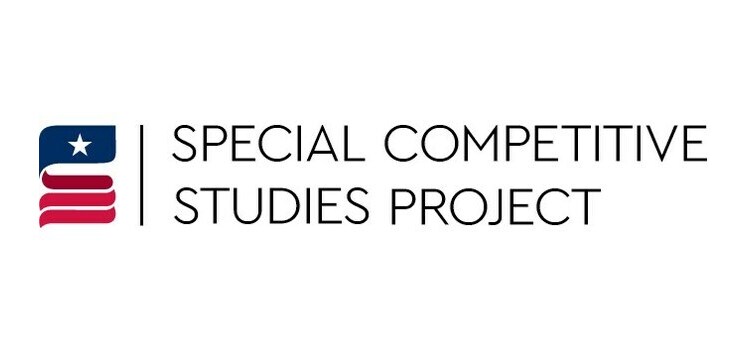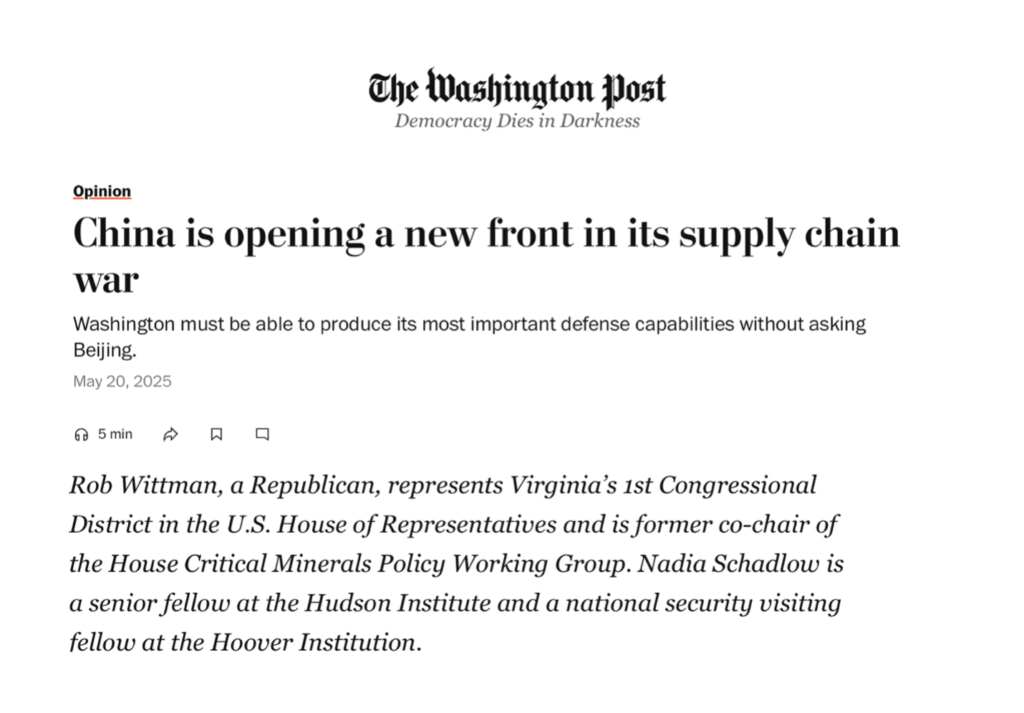
Washington, D.C. — On May 6, 2025, the Special Competitive Studies Project—Chaired by former CEO of Google Dr. Eric Schmidt, interviewed Vulcan Elements CEO John Maslin about the critical role of rare earth magnets for American national security and economic competitiveness. Maslin was joined by Dr. Nadia Schadlow, a Senior Fellow at the Hudson Institute and the former Deputy National Security Advisor for Strategy to President Donald Trump. Dr. Schadlow was the architect of the 2017 National Security Strategy of the United States—the document that put strategic competition with China on the map.
The Special Competitive Studies Project is a non-partisan, non-profit initiative whose mission is to make recommendations to strengthen America’s long-term competitiveness as artificial intelligence and other emerging technologies reshape our national security, economy, and society. The Project endeavors to ensure that America is positioned and organized to win the techno-economic competition between now and 2030—the critical window for shaping the future.
Maslin and Schadlow’s discussion underscored how China’s near-monopoly on rare earth magnet manufacturing poses a significant national security and economic vulnerability for the United States—and identified projects and leaders like Vulcan Elements that are committed to building a resilient, independent U.S. rare earth magnet supply chain.
As Maslin put it explicitly, the critical vulnerabilities in America’s magnet supply chain exposed by China’s April 4 export restrictions on rare earth magnets are the reason that Vulcan Elements exists: “We exist because of issues like this… When we talk about our ability not just to have diverse and resilient supply chains but to protect the warfighter and the country, this is one of the specific supply chains where being completely reliant on an adversary is something that we cannot earnestly say is okay.”
Maslin pointed to the key gaps in the rare earth supply chain where Beijing has America locked in a chokehold—processing and manufacturing. “China does 55% of the mining; they [manufacture] over 90% of the magnets. I like to think about it in terms of minerals versus components. If I give you a handful of neodymium powder, you can’t put that into a cell phone or an F-35. It’s all about the processing and manufacturing to turn that into a component. That’s what’s missing in the United States and in the West right now.”
Finally, Maslin emphasized the importance of not only competing with Chinese technology and engineering—but leapfrogging and outperforming Beijing: “If you just copy and paste China, you’re going to lose. The labor costs are higher here. Environmental regulations are higher here. We need to be more creative and innovative in what we’re doing. We need to think about automation, about 21st-century ways of manufacturing.”
Listen to the full conversation: https://scsp222.substack.com/p/episode-77-nadia-schadlow-and-
john
Dr. Schadlow recently published an outstanding op-ed in The Washington Post, co-authored with Congressman Rob Wittman—who co-chaired the House Critical Minerals Policy Working Group. The op-ed highlighted the urgency of reshoring American magnet manufacturing, and presented concrete policy solutions. Their bottom line: “China has our rare earth magnet supply in a chokehold… Washington must wake up to this next front in China’s supply chain warfare.”

Read the op-ed here: https://www.washingtonpost.com/opinions/2025/05/19/us-china-rare-earth-
magnets/
Vulcan Elements manufactures permanent sintered NdFeB magnets for critical defense and commercial applications. Vulcan Elements is committed to strengthening the domestic rare earth magnet supply chain by advancing technological innovations, galvanizing America’s manufacturing workforce, and collaborating with public and private sector stakeholders.
For further inquiries, please contact:
Jonah Glick-Unterman
Chief of Staff
Email: [email protected]